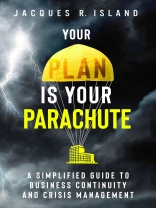Myriad crises can affect your business-from natural disasters to human-caused ones, like product sabotage, lawsuits, a pandemic or other health crisis, or terrorism. Your business’ survival and successful recovery depends on your continuity plan.
Changes are that your business will face at least one disruptive or potentially crippling event in the near future. Will you be able to avert it? If not, will your business survive?
Through this book’s simple explanations and illustrations you can quickly and easily create a business continuity plan with the following components-your business parachute-in a day’s time:
· Threat and risk assessment
· Early warning system
· Risk mitigation strategies
· Crisis response program
· Business impact assessment
· Business continuity assessment
Worksheets that are included in the book are also available for download through the publisher.
Table des matières
A propos de l’auteur
Jacques Island has spent his working life with various U.S. Government agencies dealing with crises. After military service in Vietnam and Germany he was recruited into the U.S. Foreign Service as a counterintelligence/counter-terrorism agent-operative protecting U.S. embassies, dignitaries and diplomats on missions around the world, and foreign dignitaries on state visits to the U.S. He was awarded a U.S. Department of State Meritorious Honor Service medal for his role in organizing and executing the ground and air evacuation of U.S. embassy personnel from Nicaragua amidst chaotic civil war fighting. Crisis management was also a large part of Jacques’ work during his 20-year career as an agent of the Federal Bureau of Investigation. During his tenure with the F.B.I. he worked major frauds, product tampering and piracy crimes that affected the solvency of victim companies, and dealt with prison uprisings, aircraft hijackings, hostage takings, and terrorists from the left, the right and from abroad that threatened the interests of the United States. He was trained and certified by the F.B.I. as a crisis negotiator and spent most of his F.B.I. career on their crisis management teams. Upon retirement from the F.B.I. in 2002, Jacques turned his attention to the private sector as a risk/crisis management consultant to companies, large and small. This book is one more step in his efforts to help businesses reach greater crisis management awareness and preparation before they are hit by a ruinous event.












